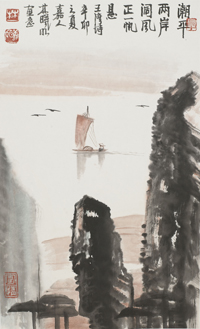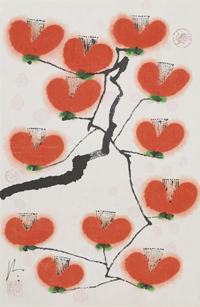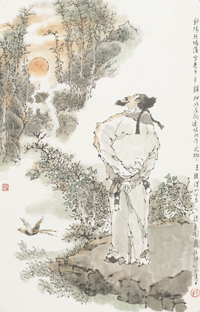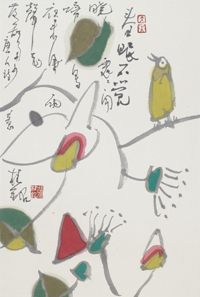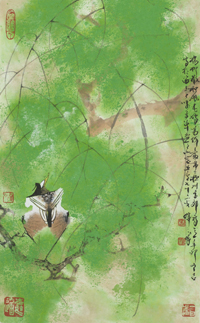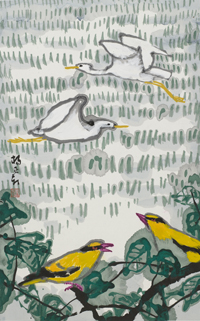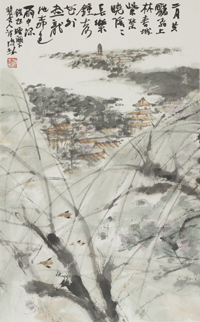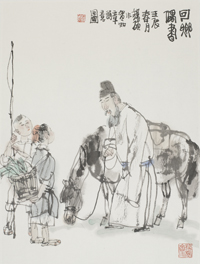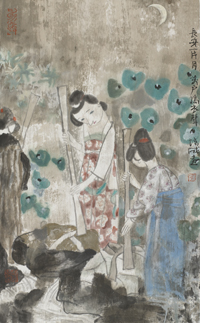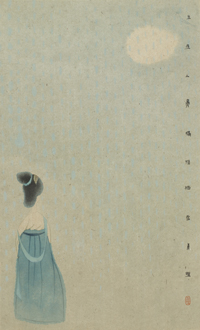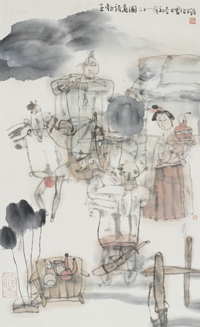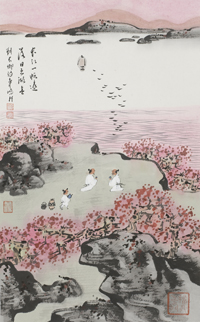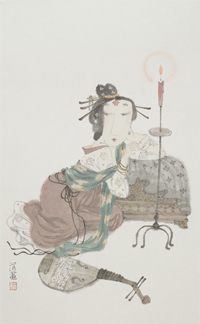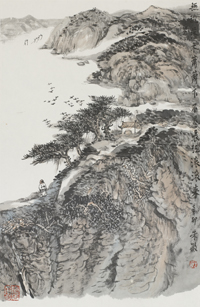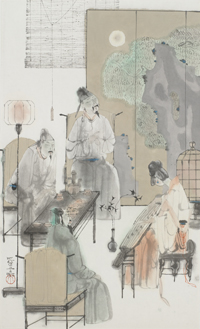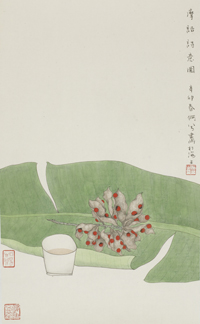Opens Tang Poetry in Paintings Exhibition and Starts Song Lyrics in Paintings Project
Shanghai Qinghe Culture Communication Co. Ltd and Shanghai Bridge 8 Culture Industry Investment Co. Ltd. jointly held Tang Poetry in Paintings Exhibition at Shanghai Art Center (No. 681 Julu Road, Shanghai) from Feb.21 to Mar. 8, 2014. Famous Painters Chen Jialing, Zhang Guiming, Yang Zhengxin, Zhang Peicheng, Zhang Leiping, Zhu Xinchang, Ma Xiaojuan, Zhu Min, Jiang Hong, Ding Xiaofang, Hong Jian, Bao Ying and Pang Fei participated in the opening ceremony on Feb.21.
In 2012, Shanghai Qinghe Culture Communication Co. Ltd, together with NOCFL (National Office for Teaching Chinese as a Foreign Language) and HQ of Confucius Institute, invited 18 master painters from Chinese Painting Academy Shanghai Branch to draw 108 paintings to illustrate 108 Tang Poems and to show the glorious history of Tang Poetry. The painters are Chen Peiqiu, Lin Ximing, Dai Dunbang, Shi Dawei, He Xi, etc. Meanwhile, CTPC (China Translation & Publishing Corporation) published this book named Hua Shuo Tang Shi (Tang Poetry in Paintings) in bilingual and the poems were translated by famous translator Professor Xu Yuanchong. This bilingual book was recommended by NOCFL and HQ of Confucius Institute to be the supplementary reading material for foreigners over 100 countries and regions to learn Chinese in Confucius Institute.
Based on these successful events, Shanghai Qinghe Culture Communication Co. Ltd, and Shanghai Bridge 8 Culture Industry Investment Co. Ltd have jointly started the project of Song Lyrics in Paintings and will again invite 20 master painters from Chinese Painting Academy Shanghai Branch and famous painter in Jiangsu (Gao Yun, Yu Hui) and Zhe Jiang (Chen Xiangxun, Xu Mo) to draw painting to show the unique poetic imagery of Song Lyrics. We will still invite Professor Xu Yuanchong to translate each Song Lyric and CTPC will also publish it in bilingual and try to make it the recommended reading material for NOCFL and HQ of Confucius Institute so that more and more foreigners will understand traditional Chinese culture through the bilingual version of Hua Shuo Tang Shi (Tang Poetry in Paintings) and Hua Shuo Song Ci (Song Lyrics in Paintings) and to love China and traditional Chinese Culture.

Painter: Chen Peiqiu
| Gazing Afar from a Southern Temple on an Autumn Day Liu Changqing The ancient temple strewn with fallen leaves, Autumn invades a homesick heart and grieves. Unvisited monasteries wild would seem With cloudy peaks beyond deep stream on stream. The setting sun sinks behind mountains high; The chill bell fills the dale with sigh on sigh. Brooding over Southern Dynasties’ fall, The lonely Rivers flows in spite of all. |
|
|
Passing by the Northern Mountains Wang Wan My boat goes by green mountains high And passes through the river blue. The banks seem wide at the full tide; A sail with ease hangs in soft breeze. The sun brings light born of last night; New spring invades last year that fades. Where can I send word to my friend? Homing wild geese, fly westward, please! |
| |
|
|
|
Our Native Place Wang Wei You come from native place, What happened there you’ d know. Did mume blossoms in face Of my gauze window blow? |
|
|
Rural Scene by River Wei Wang Wei The village lit by slanting rays, The cattle trail on homeward ways. See an old man for the herd wait, Leaning on staff by wicket gate. Pheasants call in wheat field with ease, Silkworms sleep on sparse mulberries. Shouldering hoe, two ploughmen meet; They talk long, standing on their feet. For this unhurried life I long, Lost in singing ‘Home-going song’. |
| |
|
|
|
A Spring Morning Meng Haoran This spring morning in bed I’ m lying, Not to awake till birds are crying. After one night of wind and showers, How many are the fallen flowers! |
| |
|
|
|
The Eastern Countryside Wei Yingwu Staying in office all the year, I go to countryside one morning clear. Willows swing and sway in soft breeze; Fading blue hills put my mind at ease. I go among trees for a rest, And along a creek east and west. The drizzle sweetens grassy plain, Where I hear turtledoves’ refrain. The solitude delights my heart. How can I leave it far apart? I would build here my hermitage And live a life like ancient sage. |
|
|
Rainy Days in My Riverside Hermitage Wang Wei After long rain cooking fire’ s made late in the village; Millet and greens are cooked for those doing tillage. Over the boundless paddy fields egrets fly; In gloomy summer forest golden orioles cry. In quiet hills I watch short-lived blooms as I please, And eat sunflower seeds under the green pine trees. With other villagers I would not disagree: Even sea gulls from far away would come near me. |
| |
|
|
|
For Secretary Pei of the Imperial Court Qian Qi In royal garden see orioles in vernal flight, The morning clouds shed shades on the capital bright. The happy palace bells are heard beyond the flowers; The poolside willows look freshened after the showers. But the sun has not warmed a poor heart aiming high, Though I’ ve tried my best to brighten the azure sky. For ten years I’ ve not won success by my word fair, How dare I put the golden pin in my white hair? |
| |
|
|
|
Home-Coming He Zhizhang I left home young and not till old do I come back, Unchanged my accent, my hair no longer black. The children whom I meet do not know who am I, 'Where do you come from, sir?'they ask with beaming eye. |
| |
|
|
|
Southern Ballad of Autumn Li Bai Moonlight is spread over the capital, The sound of pounding clothes far and near Is brought by autumn wind which can’ t blow all The longings away for far-off frontier. When can we vanquish the barbarian foe So that our men no longer into battle go? |
| |
|
|
|
Waiting in Vain on Marble Steps Li Bai The marble steps with dew turn cold. Silk soles are wet when night grows old. She comes in, lowers crystal screen, Still gazing at the moon serene. |
| |
|
|
|
Farewell to Prefect Du Wang Bo You’ ll leave the town walled far and wide For mist-veiled land by riverside. I feel on parting sad and drear For both of us are strangers here. If you have friends who know your heart, Distance cannot keep you apart. At crossroads where we bid adieu, Do not shed tears as women do! |
| |
|
|
|
Farewell to South-going Wang the Eleventh Liu Changqing A broad stream shuts you out of sight; I wave my hand, sleeves wet with tears. Oh, where will stop the bird in flight? In vain the green hill sad appears. Your sail on the stream far away Brings spring to the five lakes with speed. The sun sheds its departing ray On the heart-broken white reed. |
| |
|
|
|
A Lover’ s Dream Jin Changxu Drive orioles off the tree For their songs awake me From dreaming of my dear Far-off on the frontier! |
| |
|
|
|
The Deserted Bai Juyi Her kerchief soaked with tears, she cannot fall asleep, But overheard band music waft when night is deep. Her rosy face outlasts the favor of the king; She leans on her perfumed bed till morning birds sing. |
| |
|
|
|
On the Height Du Fu The wind so swift, the sky so wide, apes wail and cry; Water so clear and beach so white, birds wheel and fly. The boundless forest sheds its leaves shower by shower; The endless river rolls its waves hour after hour. A thousand miles from home, I’ m grieved at autumn’ s plight; Ill now and then for years, alone I’ m on this height. Living in times so hard, at frosted hair I pine; Cast down by poverty, I have to give up wine. |
| |
|
|
|
Song of the Zither Li Qi The host invites his guests to drink his happy wine, And asks the zitherist to play a melody fine. The moon shines on town walls and startles half the crows, All the frost-bitten trees shiver when the wind blows. The bronze censer appears brighter in candlelight, The zitherist plays Green Waves and the Princess Bright. When the music begins, silence reigns in the hall; Fascinated by the song, shivering stars would fall. The Northern messenger comes from so far away, He seems to know the beauty of cloud since today. |
| |
|
|
|
Love Seeds Wang Wei The red beans grow in southern land. How many load in spring the trees? Gather them till full is your hand; They would revive fond memories. |
About the Translator
Xu Yuanchong (1921- )
Professor at Peking University, author and / or translator of 120 literary works in Chinese, English and / or French. His writings in Chinese and / or English include Art of Translation, On Literary Translation, On Chinese Verse in English Rhyme from the Book of Poetry to the Romance of the Western Bower, Vanished Springs, etc. His English translations include Book of Poetry, Elegies of the South, Thus Spoken the Master, Laws Divine and Human, 300 Tang Poems, 300 Song Lyrics, 300 Yuan Songs, Romance of the Western Bower, etc. His French translations include 300 Poèmes Chinois Classiques, etc. His translations from English and French authors include Dryden’s All For Love, Scott’s Quentin Durward, Hugo’s Hernani, Stendhal’s Le Rouge et le noir, Balzac’s Le Père Goriot, Flaubert’s Madame Bovary, Roman Rolland’s Jean Christophe, etc.
About the Painters
Chen Peiqiu
Chen Peiqiu, born in 1923, is a native of Nanyang, Henan Province. Chen graduated from the Economics Department of National Southwest Associated University and the National Art School. She serves as Art Advisor to Shanghai Chinese Painting Academy, holding the title of Level-1 Artist. Chen is a member of China Artists Association and Shanghai Research Institute of Culture and History, an honorary Advisor to Shanghai Artists Association and Advisor to Shanghai Calligraphers Association. She also works as an adjunct professor at the College of Fine Arts, Shanghai University.
Lin Ximing
Lin Ximing, born in 1925, is a native of Yongjia, Zhejiang Province. Former painter with Shanghai Chinese Painting Academy, he retired in 1996. He is a member of China Artists Association, and an adjunct professor of the College of Fine Arts, Shanghai University, holding the title of Level-1 Artist.
Chen Jialing
Chen Jialing, born in 1937, is a native of Hangzhou, Zhejiang Province. Graduating from the Traditional Chinese Painting Department of Zhejiang Academy of Fine Arts, he is now an adjunct painter with Shanghai Chinese Painting Academy, member of China Artists Association and Shanghai Artists Association, and professor of the College of Fine Arts, Shanghai University.
Dai Dunbang
Dai Dunbang, born in 1938, is a native of Zhenjiang, Jiangsu Province. He is an adjunct painter with Shanghai Chinese Painting Academy, a member of China Artists Association and Vice-Director of its Comic Strips Council. He also serves as Executive Director of Shanghai Artists Association and a professor of Shanghai Jiao Tong University.
Zhang Guiming
Zhang Guiming, born in 1939, is a native of Shaoxing, Zhejiang Province. Graduating from the Traditional Chinese Painting Department of Zhejiang Academy of Fine Arts, he is an adjunct painter with Shanghai Chinese Painting Academy and a member of its Art Council, holding the title of Level-1 Artist. He is also a member of China Artists Association, Shanghai Artists Association, Shanghai Calligraphers Association and Shanghai Federation of Literary and Art Circles. He is awarded the special allowance by the State Council.
Han Tianheng
Han Tianheng, born in 1940, is a native of Suzhou, Jiangsu Province. Han is Art Advisor to Shanghai Chinese Painting Academy, holding the title of Level-1 Artist, and President of Chinese Academy of Seal Engraving. He is also a member of China Artists Association, Shanghai Artists Association, and Shanghai Federation of Literary and Art Circles. He also holds the positions of Vice-director of the Seal Engraving Council of China Calligraphers Association, Chief Advisor to Shanghai Calligraphers Association, and is a professor of the Graduate School of Chinese Social Science Academy, and an adjunct professor of Shanghai Jiao Tong University. He is a recipient of the special allowance granted by the State Council.
Yang Zhengxin
Yang Zhengxin, born in 1942, is a native of Shanghai. Graduating from Shanghai Fine Arts School, he now works as a painter with Shanghai Chinese Painting Academy and is a member of its Art Council, holding the title of Level-1 Artist. He is also a member of China Artists Association and Shanghai Artists Association, and an adjunct professor of the College of Fine Arts, Shanghai University.
Xiao Haichun
Xiao Haichun, born in 1944, is a native of Fengcheng, Jiangxi Province. Graduating from Shanghai Arts and Crafts School, he works now as an adjunct painter with Shanghai Chinese Painting Academy, and is a master of arts and crafts. He is also a member of Shanghai Artists Association and its Traditional Chinese Painting Committee.
Han Shuo
Han Shuo, born in 1945, is a native of Hangzhou, Zhejiang Province, and a graduate of the Traditional Chinese Painting Department of the College of Fine Arts, Shanghai University. Former Vice-President of Shanghai Chinese Painting Academy, he now works as a painter with Shanghai Chinese Painting Academy and Director of its Art Committee, holding the title of Level-1 Artist. He is also Director of China Artists Association and a member of its Traditional Chinese Painting Committee. He also holds the positions of Vice-President of Chinese Painting Institute, Executive Director of Shanghai Artists Association and Director of its Traditional Chinese Painting Committee, and is an adjunct professor of the College of Fine Arts, Shanghai University. He is a recipient of the special allowance granted by the State Council.
Zhang Peicheng
Zhang Peicheng, born in 1948, is a native of Taicang, Jiangsu Province. He works as an adjunct painter with Shanghai Chinese Painting Academy and Vice-Director of its Art Council, holding the title of Level-1 Artist. He is also a member of China Artists Association, Vice-Chairman of Shanghai Artists Association and a member of its Traditional Chinese Painting Council, and an adjunct professor of the College of Fine Arts, Shanghai University.
Lu Fusheng
Lu Fusheng, born in 1949, is a native of Dongyang, Zhejiang Province and a graduate of Zhejiang Academy of Fine Arts. He works as an adjunct painter with Shanghai Chinese Painting Academy and Vice-Director of its Art Council. He is also Director of China Artists Association, Vice-Chairman of Shanghai Artists Association, and President and Chief-editor of Shanghai Literature & Art Publishing House. He is a member of Shanghai Committee of the Chinese People's Political Consultative Conference and Shanghai Federation of Literary and Art Circles, and a PhD supervisor of China Academy of Art..
Shi Dawe
Shi Dawei, born in 1950, is a native of Huzhou, Zhejiang Province, and a graduate of the Traditional Chinese Painting Department of the College of Fine Arts, Shanghai University. He is Vice-Inspector of Shanghai Municipal Administration of Culture, Radio, Film and TV and President of Shanghai Chinese Painting Academy, holding the title of Level-1 Artist. He is also a member of the National Committee of Chinese People's Political Consultative Conference, and Vice-Chairman of China Artists Association. He is Chairman of Shanghai Federation of Literary and Art Circles and Shanghai Artists Association, and Director of Shanghai Lin Fengmian Research Institute. He also serves as an adjunct professor at the College of Fine Arts, Shanghai University and a guest professor of Shanghai Institute of Visual Art, Fudan University. He is awarded the special allowance by the State Council.
Che Pengfei
Che Pengfei, born in 1951, is a native of Laiyang, Shandong Province, and a graduate of Shanghai Normal University. Former Vice-President of Shanghai Chinese Painting Academy, he works as a painter with Shanghai Chinese Painting Academy and is a member of its Art Council, holding the title of Level-1 Artist. He is also a member of China Artists Association, Executive Director of Shanghai Artists Association and a member of its Traditional Chinese Painting Council.
Zhu Xinchang
Zhu Xinchang, born in 1954, native of Ningbo, Zhejiang Province, graduated from the Fine Arts Department of Shanghai Normal University and joined the 1st advanced program of Shanghai Chinese Painting Academy. He now works as a painter with Shanghai Chinese Painting Academy, and Vice-Director of its Teaching and Research Office, holding the title of Level-1 Artist. He is also a member of China Artists Association and Shanghai Artists Association.
Ma Xiaojuan
Ma Xiaojuan, born in 1955, native of Nanjing, Jiangsu Province. She obtained her master degree from the Traditional Chinese Painting Department of China Academy of Art. She works as a painter with Shanghai Chinese Painting Academy, and Director of its Teaching and Research Office, holding the title of Level-1 Artist. She is also a member of China Artists Association and Shanghai Committee of the Chinese People's Political Consultative Conference, and Director of Shanghai Artists Association and a member of its Traditional Chinese Painting Council.
Zhu Min
Zhu Min, born in 1956, native of Xinchang, Zhejiang Province, graduated from Shanghai Arts and Crafts School and the Traditional Chinese Painting Department of China Academy of Art, and joined the 1st advanced program of Shanghai Chinese Painting Academy. He works as a painter with Shanghai Chinese Painting Academy, holding the title of Level-2 Artist, and Vice Director of its Creativity and Research Office. He is also a member of Shanghai Artists Association.
Ding Xiaofang
Ding Xiaofang, born in 1957, native of Shaoxing, Zhejiang Province, graduated from the College of Fine Arts, Shanghai University and joined the 1st advanced program of Shanghai Chinese Painting Academy. He works as a painter with Shanghai Chinese Painting Academy, holding the title of Level-2 Artist, and Vice-Director of its Marketing Department. He is also a member of China Artists Association and Shanghai Artists Association.
He Xi
He Xi, born in 1960, is a native of Jiaxing, Zhejiang Province, and a graduate from the Traditional Chinese Painting Department of Zhejiang Academy of Fine Arts. He is a painter with Shanghai Chinese Painting Academy, concurrently serving as Director of the Creativity and Research Office, holding the title of Level-1 Artist. He is also a director of Shanghai Artists Association and a member of its Traditional Chinese Painting Council and China Artists Association.
Tang Poetry: Appealing to All
The Tang Dynasty was the heyday of classical Chinese poetry. A good many outstanding poets of various schools brought prosperity to the art of poetry. Among them, Li Bai, Du Fu, Bai Juyi, Wang Wei and Li Shangyin contributed the most to the boom of Tang poetry. Their works have produced a far-reaching influence over the past one thousand years.
The Three Hundred Tang Poems was compiled by Sun Zhu in 1763, the 28th year of Emperor Qianlong’s reign in the Qing Dynasty. The whole book includes 310 poems composed by over 70 poets.
A native of Wuxi, Sun Zhu was also known as Linxi or Qinxi (courtesy name) and Hengtang or Tuishi (literary name). He was born on July 10 (Chinese lunar calendar) in 1711, the 50th year of Emperor Kangxi’s reign in the Qing Dynasty, and passed away at the age of 68 on December 7 (Chinese lunar calendar) in 1778, the 43rd year of Emperor Qianlong’s reign, buried at Chenwanli, Jingyun Village, Wuxi City. He passed the palace examination in 1751, the 16th year of Emperor Qianlong’s reign, and the positions he held in the government were Magistrate of Zouping County, and Educational Official of Jiangning City, Shandong Province. His works were included in Hengtang Causerie. According to historical records, Sun Zhu was ‘a clever and diligent man from a poor family’.
An incorruptible official, he was concerned about common people’s sufferings and often gave lectures to them, which touched them deeply. He was always a diligent learner in his lifetime, even in his later years.
Since it came out over two centuries ago, Three Hundred Tang Poems has been very popular at home and abroad with numerous editions in different prints and annotations. At the prime time, almost every Chinese household kept one copy of the book. Although designed to be a primer for students of traditional Chinese private schools, the book has turned out to cater to both refined and popular tastes. All easy to recite, the selected poems cover different styles and subjects and represent the best works of poets of different schools and in different periods.
I did not have the chance to read Three Hundred Tang Poems when I was a child because of the Cultural Revolution. When I eventually got the book, it was not my best age to read it any more so I only recited some of the poems occasionally. However, I have enjoyed reading it since then and collected dozens of versions of this book . I have also come across some inferior versions with rough illustrations and coarse printings. None of them helped to display the real charm of Tang poems. It is a pity for such a classic!
At the end of 2005, I planned to invite painters of the Shanghai School to illustrate Sun Zhu’s version of the book. But the plan was shelved for various reasons until early 2010. Over the past two years, each of the 108 Tang poems has been illustrated with a delicate painting thanks to the support of 18 outstanding painters of the Shanghai School, including Chen Peiqiu, Lin Ximing, Chen Jialing, Dai Dunbang, Zhang Guiming, Han Tianheng, Yang Zhengxin, Xiao Haichun, Han Shuo, Zhang Peicheng, Lu Fusheng, Shi Dawei, Che Pengfei, Zhu Xinchang, Ma Xiaojuan, Zhu Min, Ding Xiaofang and He Xi. It is like a selected collection of contemporary Shanghai School paintings. Moreover, Mr. Chen Peiqiu and Mr. Gao Shixiong respectively inscribed and engraved the four Chinese characters ‘Hua Shuo Tang Shi’ (Tang Poetry in Paintings) for the new book, drawing the collective effort to a successful conclusion.
The Chinese-English Tang Poetry in Paintings is jointly published by Shanghai Qinghe Culture and Communication Co., Ltd., Confucius Institute Headquarters, and China Translation and Publishing Corporation. It is intended to help the world better understand traditional Chinese culture and cement the friendship between China and the world. The participation of Mr. Xu Yuanchong, a senior expert in translating Tang poetry into English, only adds luster to the book. Lastly, I would like to wish the book a great success both at home and abroad.




